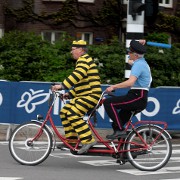 Brenno de Winter is an investigative reporter who was declared Journalist of the Year 2011 and that accolade seems to have the entire Dutch government quaking in its boots.
Brenno de Winter is an investigative reporter who was declared Journalist of the Year 2011 and that accolade seems to have the entire Dutch government quaking in its boots.
Crazy chain mails about the danger he poses are doing the rounds at all levels of Dutch government. De Winter wrote last Monday:
The army has been alerted, the National Coordinator for Security and Counterterrorism has been brought in and all the departments have been warned. Letters are circulating among thousands of civil servants containing my home address and photos of me. We are at threat level one because Brenno is in the country and whoever spots him should raise the alarm immediately.
The alarming mails started because somebody believed De Winter was working on an article about government security.
De Winter found out that there was a campaign being staged against him when he went to the Finance Ministry for a meeting and a lunch. “A woman said: ‘We have to call security because we have a protocol about you.'” Four security agents came to bark at De Winter for a while before letting him go to his appointment, but not without one of them accompagnying De Winter: “The man watched everything. What I ate, how I ate it, whom I talked to, how I spoke and what I talked about.”
Both the police and the Ministry of Internal Affairs have distributed correction letters clearing De Winter’s name, although it remains to be seen how effective these rectifications are. The police seems to have an effective system for distributing libel, but not for retracting it. The police’s correction points out how damaging the chain mails are: “These actions paint an incorrect picture of Mr De Winter and hinder him without reason in his profession as an investigative reporter. Certain data about Mr De Winter have been distributed illegally and without sufficient regard for professional standards.”
De Winter’s main qualm with the campaign against him is that it does nothing to intercept real bad actors.
In 2000 reporter Willem Oltmans was awarded 8 million guilders in damages following a conspiracy by the Dutch government to silence him after he had interviewed president Sukarno of former Dutch colony Indonesia.
See also: No fees for freedom of information requests says Dutch Supreme Court
